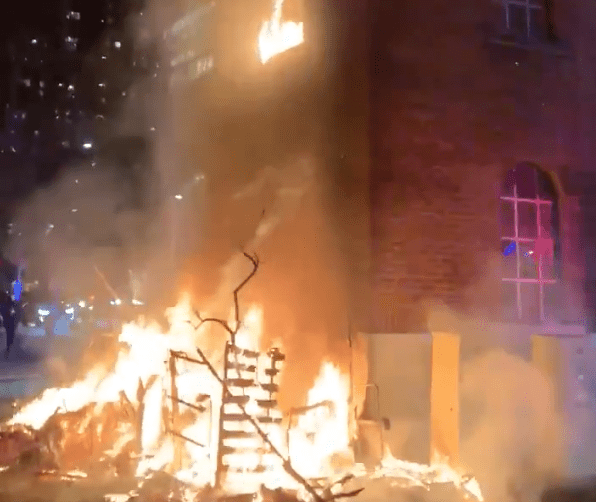Lawlessness is on the streets of Texas’ capital city.
As Austinites prepare for a pivotal public vote in May over legalized homeless encampments, many citizens already see the chaos that has unfolded in their communities and neighborhoods—including the recent arson of a downtown landmark.
Late last week, homeless individuals set fire to Buford Tower, a 1930s iconic bell tower that’s listed on the National Register of Historic Places. The Austin Fire Department ruled the fire as “incendiary,” or intentionally set, saying the flames spread from a nearby homeless campfire.
The department estimated damages to the tower at $12,000, adding the blaze was one of three out-of-control homeless fires in just 24 hours, along with eight camps that were violating the city’s open burning rules. AFD told local news station KVUE that “these are becoming more common.”
PEH camp fire has extended into our iconic Buford Fire Tower at Cesar Chavez and Colorado. pic.twitter.com/3fd0Y84wOR
— Austin Fire Info (@AustinFireInfo) April 2, 2021
The fires are only the latest consequence of Austin city officials’ harmful decisions.
The story began in 2019, when the Democrat-run Austin City Council legalized homeless camping in nearly all public spaces (except city hall, notably).
The council’s action sparked a swarm of new tent cities along sidewalks and neighborhoods, a drastic increase in the city’s homeless population, a more dangerous public environment, and a wildfire of public backlash (including warnings from numerous law enforcement officials and a citizen-led petition with more than 126,000 signatures).
Violent crime subsequently rose by double digits, with homicides up 64 percent year over year in 2020 and continuing to rise in 2021.
Over the past two years, countless citizens have testified and shared their stories of experiencing assaults, thefts, vandalism, and other aggravated crimes at the hands of criminal transients who are allowed to live and roam among their apartments, businesses, schools, and neighborhoods.
Even Democrat Mayor Steve Adler recently admitted what he and the council had done wasn’t working, though he is still opposed to changing their 2019 decision.
In January, citizens successfully submitted a petition with more than 26,000 signatures to city hall to force a public vote on the issue in the May election. The camping question will now appear as Proposition B on citizens’ ballots—a “yes” vote would restore the city’s original vagrancy camping law, while “no” would leave the current tent city climate in place.
And after the fire at Buford Tower, citizens remain outraged at the public safety crisis.
“Is this the legacy you want to be remembered for, mayor, city manager, and city council members? Creating policies that enable dangerous conditions for the homeless and the rest of Austin’s citizens that ultimately create fear and distrust in your citizens?” wrote citizen Deborah Sterzing, who said her husband’s great-grandfather designed Buford Tower.
Even after the fire, Mayor Adler expressed his refusal to restore the camping rules, saying, “If we move these fires to the woods, people will die.”
“The opposition is happy with the way things are. They have no concern for families and communities impacted by the current state of affairs,” said Austinite Cleo Petricek, co-founder of citizen group Save Austin Now and a self-proclaimed lifelong Democrat. She added the mayor’s comments about forcing people into the woods were “fear-mongering” and “nonsense.”
“The city has the ability to designate locations for camping that aren’t in the woods. … It’s amazing that after years of advocacy by the opposition, the best they have to offer is disruptive camping and chaos,” Petricek said.
“Every day, Austinites are suffering from the free-for-all associated with the City’s deregulation of all public camping and aggressive panhandling,” wrote Save Austin Now on their website. “It’s not helping the homeless, and it’s not helping Austin.”
“There is human waste and garbage everywhere despite portable toilets and garbage cans nearby. There is used drug paraphernalia everywhere. Every aspect of crime is way up, i.e. assaults, murder, theft, vandalism and arson,” one Austinite commented on a city council member’s post. “THE COUNCIL’S POLICIES AREN’T WORKING. THEY ARE DESTROYING THIS CITY.”
“Mayor, we know these policies have failed miserably in several major cities across the country,” wrote another individual on social media. “At least try something different than what we already know doesn’t work.”
Early voting in Austin’s city election runs from April 19-27. Election Day is May 1.





